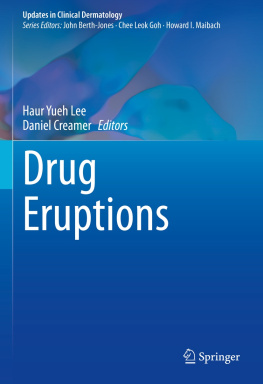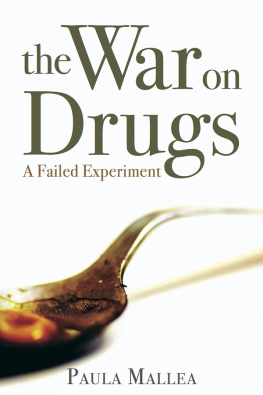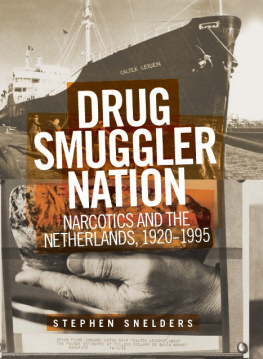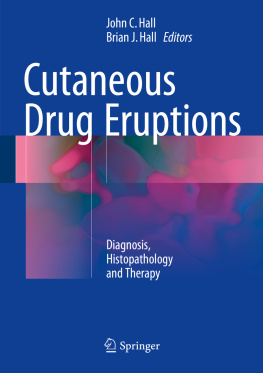Copyright 2000 OPA (Overseas Publishers Association) N.V. Published by license under the Harwood Academic Publishers imprint, part of The Gordon and Breach Publishing Group.
All rights reserved.
No part of this book may be reproduced or utilized in any form or by any means, electronic or mechanical, including photocopying and recording, or by any information storage or retrieval system, without permission in writing from the publisher.
First published in 2000 by Harwood Academic Publishers.
This edition published 2013 by Routledge
2 Park Square, Milton Park, Abingdon, Oxon OX14 4RN
711 Third Avenue, New York, NY 10017
Routledge is an imprint of the Taylor & Francis Group, an informa business
British Library Cataloguing in Publication Data
A catalogue record for this book is available from the British Library.
ISBN: 90-5823-004-X (softcover)
Drug users end up in gaol for many reasons, but in the most general terms we might divide the drug-using part of a prison population along three lines. First, there are those who are incarcerated specifically because of their involvement in the sharp end of drug use; that is they use drugs or are involved in the possession of drugs with intent to supply them to others. We may note at the start the lack of an international consensus on this issue. In some countries even the possession of cannabis in any measurable amount may result in harsh penalties, whereas possession of small amounts may not be punished at all in others. Second, there are those who are gaoled for offences other than drug use, but who happen to be involved in drug use at the same time. We may note the association in many Western countries between social deprivation, harmful self-damaging drug use and crime, and the too easy interpretation of the drugs-crime link as self evident on the basis of data that are in fact reflexive, and with the roots of both lying in factors that have little or nothing to do with drugs. Thirdly, there are those who acquired their drug habit whilst in gaol. This indicates that whilst prisons offer the opportunity to influence drug habits in a positive way, as discussed in many of the following chapters, there are instances in which certain settings can conspire with certain individuals to produce exactly the opposite effect.
From a public policy perspective, administrations can have varying views on the issue of drug use in prison. On the one hand, one can take the stance that drug use in prison is simply not to be tolerated and that any attempt to reduce the harm of such use is tantamount to condoning the practise; or one can take the opposite view and do everything possible to reduce drug related harm in prison. Whichever view is taken, there are clear similarities between trying to produce a drug-free prison and a drug-free nation. Both have clear boundaries, and the permeability or rigidity of such boundaries has clear implications for social practices and relationships within those boundaries. We can go a long way towards eliminating drugs in the UK, for example, provided we are all happy to be strip searched every time we leave or enter the country. So it is with prisons. The question Which approach is best? is not solely answerable in simple empirical terms, since science struggles with questions which include or imply the word ought. Nonetheless, evidence from different places and parts of the world might help in the process of arriving at an informed moral decision.
The contributors to this book are experts from a variety of professional backgrounds, drawn together to provide an international perspective on drug use and prisons. There is, therefore, a diversity of professional opinion and cultural viewpoints contained within the eleven chapters. Common themes are apparent, however. Each contributor stresses the importance of prison as a setting for public health intervention, both in terms of preventing the spread of viral infections and in providing the opportunity for behavioural change. Indeed, it can be argued that the public health requirements for prison systems represent a moral and legal issue. But while it is acknowledged that the quality of health care available in prisons should be comparable to that available in the community, historically prisons have been reluctant to introduce some of the more radical recent developments in drug policy and practice. Whether this has been an overly cautious position is open to debate, but there are strong arguments for the carefully controlled and evaluated introduction of innovative drug services in prisons, and the development of such schemes in European prisons is described in this book. In contrast, in developing countries, where while there is an equal if not greater need for the introduction of a range of drug services in prisons, such public health developments are challenged by the range of grave social problems. But even in industrialised countries, there are obstacles to changing drug policy and practice in prisons.
Another common theme throughout the book is that prisons contain a disproportionate number of individuals with serious mental health problems, including addiction. There is both a requirement and an opportunity within prisons to address these problems, although the sheer scale of this problem in prisons puts enormous pressure on treatment services, to an extent that is detrimental to fully effective mental health care and treatment.
The chapters in this book all acknowledge the importance of research as a basis for shaping policy and practice. The role of research in informing policymakers should be pivotal, and it is to be hoped that research findings are fully incorporated into the development of prison drug policy and practice, in such a way that the health, moral and pragmatic dimensions achieve some sort of reasonable balance. A range of organisations will have a role to play in this process, and it is important that policies are developed within prisons which are balanced, and which represent the views and needs of all those involved, including prisoners and prison staff.
Prisons have the potential to act as settings for high risk behaviour. This has implications for the provision of health care, and highlights the need for a pragmatic response that sets realistic but effective targets. The extent and the processes by which high risk behaviour among drug users in prison can lead to the transmission of bloodborne viruses such as HIV and hepatitis C are of primary concern in this context. It has to be noted, however, that while prisons have the capacity to modify drug using behaviour in ways which reduce risk behaviour, there is always the underlying potential for the creation of wide scale health and social problems through imprisoning large numbers of drug users.
The final conclusion of the authors is, therefore, that steps have to be taken to reduce the potential risks associated with the use of illegal drugs in prisons; an aim which requires us to ask some fundamental questions about the appropriateness of prison for certain categories of offender. It may be that we shall eventually conclude that prison is not appropriate for those convicted of offences associated with drug use; and that for those imprisoned for different offences but who also use drugs, harm reduction represents the only solution which has any long-term future. From such a perspective, the idea of a drug-free prison may be as unachievable as a drug-free society. We accept that not everyone would agree.









